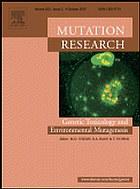|
Literature / Source Database:
Mutation Research - Fundamental and molecular mechanisms of mutagenesis
Description
an international journal on mutagenesis, chromosome breakage and related subjects
| Title (short) |
Mutat. Res. |
| CODEN |
MUREAV |
| Languages |
English |
| Impact factor |
2.581 |
|
|

|
Status
active
Subject

Source type
Journal
Publisher
ISBN ISSN
0027-5107
First volume
1
Last volume
638+
Homepage
| Resources |
|
Availability |
|
|
|
|
|
| Text PDF |
 |
free access |
 |
| Text Html |
 |
for subscriber |
 |
| References |
 |
not available |
 |
| Abstracts |
 |
|
|
| TOC |
 |
|
|
|
|
|
|

Description
Molecular and Fundamental Mechanisms broadly encompasses all aspects of research that address the detection of mutations, the mechanisms by which mutations in genes and chromosomes arise, and the modulation of mutagenesis by mutation avoidance pathways such as DNA repair, cell cycle control and apoptosis. It includes the role of genetic variation in the genesis and manifestation of mutations, ranging from the variable manner in which xenobiotics are metabolized to variations in the capacity of cells to replicate and repair damaged DNA. It also includes the contributions of these mechanisms, when perturbed, to animal disease models and to human disease, with particular emphasis on carcinogenic mechanisms. Chromosome stability is paramount for maintaining cellular homeostasis. Therefore, the Journal will publish articles on the genesis of aneuploidy and isodisomy, including the roles played by cell cycle checkpoints, spindle microtubules, centrosomes and kinetocore proteins, and agents that might disrupt them. Since isodisomy can occur as a consequence of recombination, all aspects of homologous recombination and non-homologous end joining are appropriate. Submission of appropriate epidemiological studies as well as consequences, including methods for high throughput SNP detection, DNA microarrays and proteomic approaches, are welcome. The broader scope of the journal is a reflection of the rapid advances in the field of mutation research and the recognition that cellular responses to DNA damage, including cell cycle checkpoint arrest and apoptosis, cannot be dissociated from the immediate mechanisms by which DNA is damaged and repaired.
Related links:
|